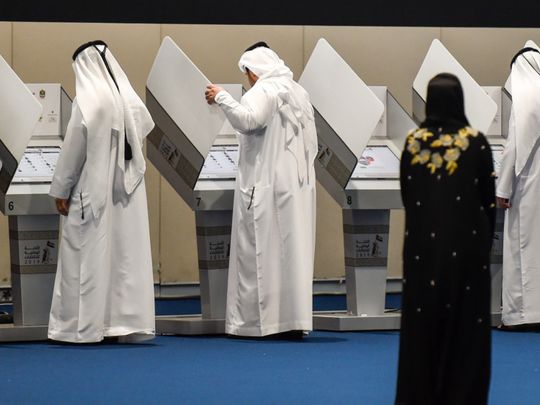UAE National Elections Committee introduces remote, hybrid voting systems for upcoming FNC elections

Image Credit: Gulf News
Abu Dhabi: The UAE National Elections Commission (NEC) has introduced the remote and hybrid voting systems for the upcoming fifth cycle of the Federal National Council (FNC) elections in 2023, to ensure the accuracy, transparency and integrity of the electoral process, in line with the country’s efforts for digital transformation.
The NEC introduced the remote and hybrid systems through its recent resolution No.25 of 2023 on the executive instructions for the FNC 2023 elections. The resolution was issued as part of preparations for the upcoming voting process, which aims to elect 20 members of the 40-seat legislature house. 50 per cent of the FNC members must be women.
The remote voting system is a smart voting system that allows voters to cast their vote from anywhere they are, whether inside or outside the country, using digital applications determined by the NEC.
Voters abroad can cast their votes from the first day of the early voting period until the end of the election’s day. There will be no polling centres at UAE diplomatic missions abroad.
The hybrid voting system is the latest and most efficient that helps ensure the accuracy and transparency of the electoral process, as well as the accuracy of the electronic counting and counting of votes.
Voters can use the hybrid voting system, which is a mixed voting system that combines the remote voting system and the electronic voting system at the headquarters of the polling centers determined by the NEC.
The introduction of the hybrid system reflects the UAE’s keenness to improve the electoral experience and achieve the best participation at the state level. The system helps facilitate, accelerate and simplify the electoral process in all its stages and all procedures.
The new voting system aims to keep pace with the digital transformation and become easier and more efficient in compliance with the best standards of speed and accuracy. It also aims to ensure the digital customer policy, on the adoption of the National Framework to Ensure Information Security, and on the use of digital identity in all government transactions.
The executive instructions serve as the comprehensive organisational framework for all stages and procedures of the electoral process.
Consisting of 69 articles divided into nine chapters, they encompass all aspects related to the committees responsible for conducting the elections. These instructions provide detailed guidelines and regulations to ensure a smooth and fair electoral process.
addition to providing guidelines for the committees overseeing the elections, the executive instructions also encompass various key aspects of the electoral process. These include the electoral rules, outlining the rights and duties of both voters and candidates. The guidelines also specify electoral violations and the corresponding penalties for such infractions. Furthermore, they address the procedures for handling appeals, as well as the processes for vote counting and the announcement of results. The comprehensive nature of these instructions ensures transparency and accountability throughout the electoral process.
The upcoming electoral cycle is a continuation of the parliamentary work process through which the UAE seeks to strengthen the FNC’s role and its legislative, oversight, and parliamentary diplomacy responsibilities. The objective is to empower the Council to contribute to national efforts towards progress and create all the necessary elements for comprehensive and sustainable development.


